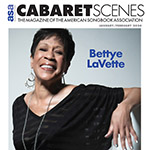Billy Stritch
My Winter Valentine
Birdland Theater, NYC, February 15, 2019
Reviewed by Alix Cohen for Cabaret Scenes

Listening to Billy Stritch tonight brought to mind Nat King Cole’s song/lyric, “I’m an Errand Boy for Rhythm (Send Me).” Stritch “gets” the groove as if born to it.
Skillfully woven together, two by Harold Arlen—“Hooray for Love” (with Leo Robin) and “Let’s Fall in Love” (with Ted Koehler)—vivaciously open the festivities. “Let’s” glissando/hands lift off the keyboard- “fall in love,” Stritch sings with infectious cheer. Watch him sit just a little straighter for high notes as if clearing a path.
“Chances Are” (Robert Allen/Al Stillman) is bookended by the evocative sound of a triangle. Its Latin-colored treatment finds much of our audience chair dancing. No matter where the performer takes a melody, its roots are thankfully present.
The familiar Bobby Short arrangement of “I’m in Love Again” (Cole Porter) whose intro is, to say the least, emphatic, segues into a lilting soft shoe then swells.
Stritch relishes the lyric. By the time we get to “It’s true, it’s love,” there’s even a bit of Short/Louis Armstrong grit in his vocal.
Cy Coleman/Peggy Lee’s “That’s My Style”—”and I know it when I see it”—conjures full skirts and narrow neckties. Powerful, tensile hands stimulate head bobbing and foot-tapping. “Meet Me at No Special Place” (J. Russel Robinson/Arthur Terker/Harry Pyle) is introduced as “a song for when the bloom is off the rose.” New to me, it’s the epitome of cool: “Meet me at no special place/And I’ll be there at no particular time.” Stritch is so relaxed that his right hand leaves the keyboard several times to gesture.
“When it comes to romantic, popular songs, Michel Legrand is in a class by himself. This (with Alan and Marilyn Bergman) was written for Barbra Streisand in Yentl.” A cottony “The Moon and I”—”we know each other well”—arrives on a sea sound of expertly bowed bass with hummingbird cymbals evoking shimmering light. The utterly lovely tune undulates. A last “I” is exhaled.
Apparently performed by Hoagy Carmichael and Jane Russell at the end of 1952’s The Las Vegas Story, “My Resistance Is Low” (Carmichael/Harold Adamson) enters gleefully and waltzy. There are fast plucks on the bass in tandem with a slide up and down the neck. The effect is textured and rich enough to be two instruments. The drums are expansively loose wristed, with precise attack. I’ve never heard a musician use brushes so adroitly. The piano is playful.
With a nod to Don Shirley, whose classical background deeply influenced his jazz piano, Stritch performs Billy Strayhorn’s “Lotus Blossom.
” The melody is dark and floaty; the playing is aptly fraught.
Guest vocalist Aisha de Haas offers an up-tempo “Love for Sale” (Porter) with a vocal like a high-hatted horn. Graceful arms extend a phrase. Piano stunt flies. “Love for sa-ayle” she sings, massaging emotion. “You’ll See” (Carroll Coates) emerges as if her man was in the room. Soft consonants, back-of-throat hum, and jazz lag add intensity. Volume rises (unnecessarily) then diminishes. “You’ll see…” drifts down like a leaf. The lady communicates.
Stritch’s encore, “The Folks Who Live on the Hill” (Jerome Kern/Oscar Hammerstein II) quietly shows respect for the number’s unfussy essence: it’s hushed, sentimental, and utterly lovely.
New to me, both Michal O’Brian (bass) and David Meade (drums) are terrific musicians.





